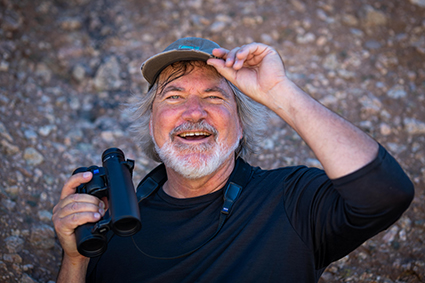Waterston Desert Writing Prize
Charles Hood – 2021 Finalist
Charles Hood is a 2021 Waterston Finalist for his piece “Deserts After Dark.” Hood grew up in Atwater beside the Los Angeles River and has been a bird guide in Africa, a translator in New Guinea, an art exhibition curator, a ski instructor, a factory worker and a National Science Foundation Artist-in-Residence in Antarctica. He says that he’s a “reformed birder,” stopping after counting 5,000 species. However, he’s recently started a world mammal list.
Hood has spent his career working and living in the Mojave Desert and is the author of 16 books. A selection of his desert-centered work earned him the 2016 Felix Pollak Prize in poetry, and in March 2017 Wisconsin University Press released the contest-winning manuscript, Partially Excited States. He also wrote Mouth, 2016 winner of the Kenneth Patchen Innovative Novel Prize. Hood’s book South x South was the 2013 Hollis Summers Prize winner, a book that recounts his experiences in Antarctica. This is Hood’s second time as a Waterston Finalist, earning the honor in 2017 for his project titled “Red Center.”
Besides the “desert” of Antarctica—Hood has been to the South Pole as an artist-in-residence—his dryland explorations have included most of the deserts in North America, plus the Atacama, Gobi, Kalahari, and Taklimakan deserts, as well as stays in Jordan, Egypt, Baja and Namibia. He first learned about the Waterston Desert Writing Prize as a resident at PLAYA, an arts and sciences residency campus located on Summer Lake, Oregon. His time at PLAYA resulted in adding three books to the shelves of its library. His next book will be a collection of essays, “A Salad Only the Devil Would Eat: The Joys of Ugly Nature,” followed by a field guide to reptiles and amphibians of the American West.
Hood says of his piece “Deserts After Dark,” “If deserts themselves are misunderstood, so too are the nocturnal sciences. Otherwise rational people are afraid of bats, think spiders are icky, or feel the need to surround their house with floodlights and security alarms. I want to change that: let’s turn off the fear (and the spotlights) and start to enjoy the other half of nature, the part that lives and breeds and thrives and howls after the sun goes down.”

